Exploring Sources of Law, Government Role & Impact on Local Businesses
VerifiedAdded on 2023/06/16
|7
|1580
|335
Essay
AI Summary
This essay provides an overview of business law in the UK, focusing on its sources, the government's role in lawmaking, and the impact of various laws on local businesses. It identifies common law, legislation, equity, and EU law as key sources, detailing how statutes and case law are applied in justice courts. The essay explains the legislative process, from the initial bill to royal assent, and discusses the impact of company law, employment law, and contract law on businesses operating in the UK. Specific examples, such as the Companies Act 2006 and the case of Various Claimants v/s Morrisons, are used to illustrate the practical implications of these laws.
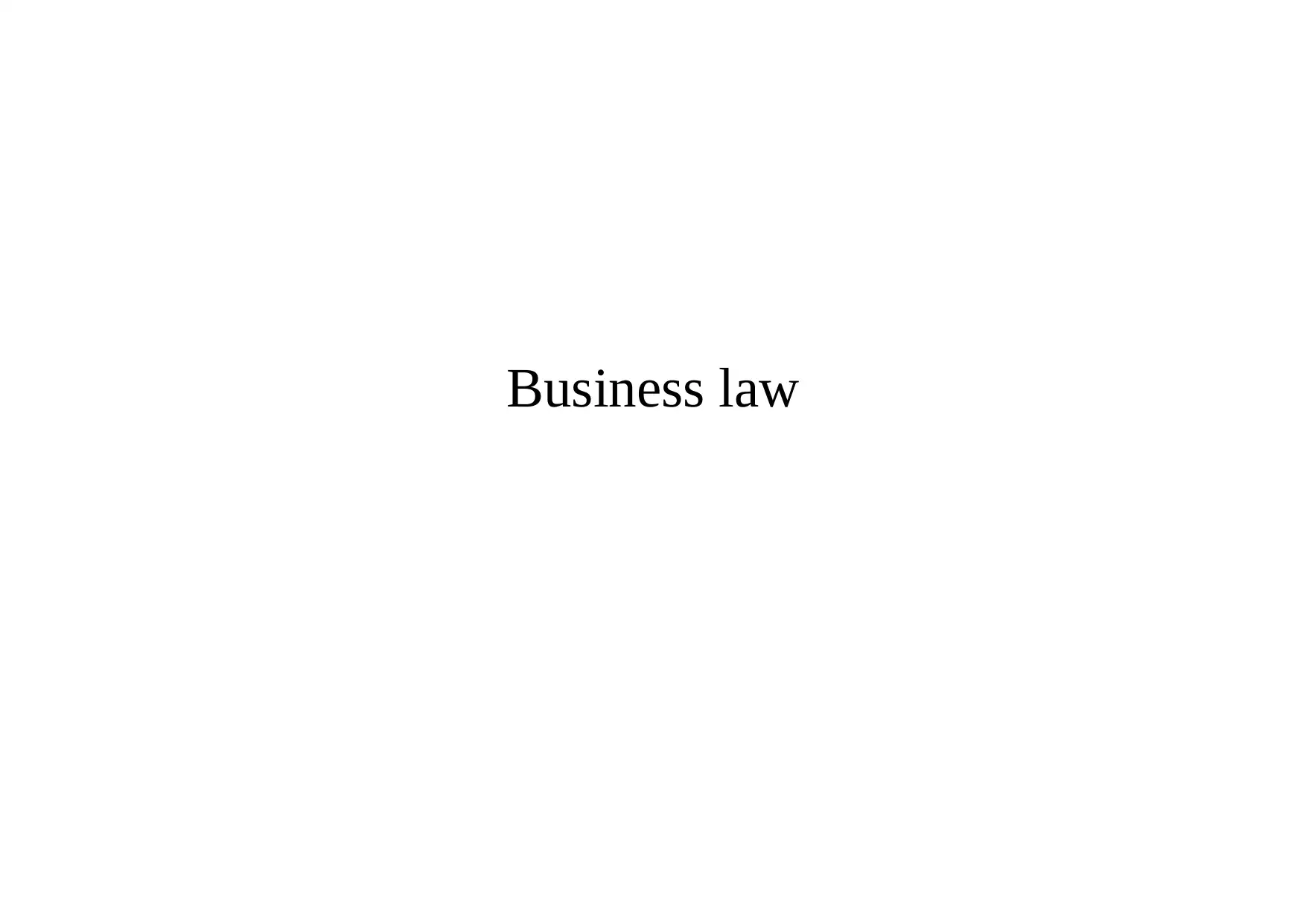
Business law
Paraphrase This Document
Need a fresh take? Get an instant paraphrase of this document with our AI Paraphraser
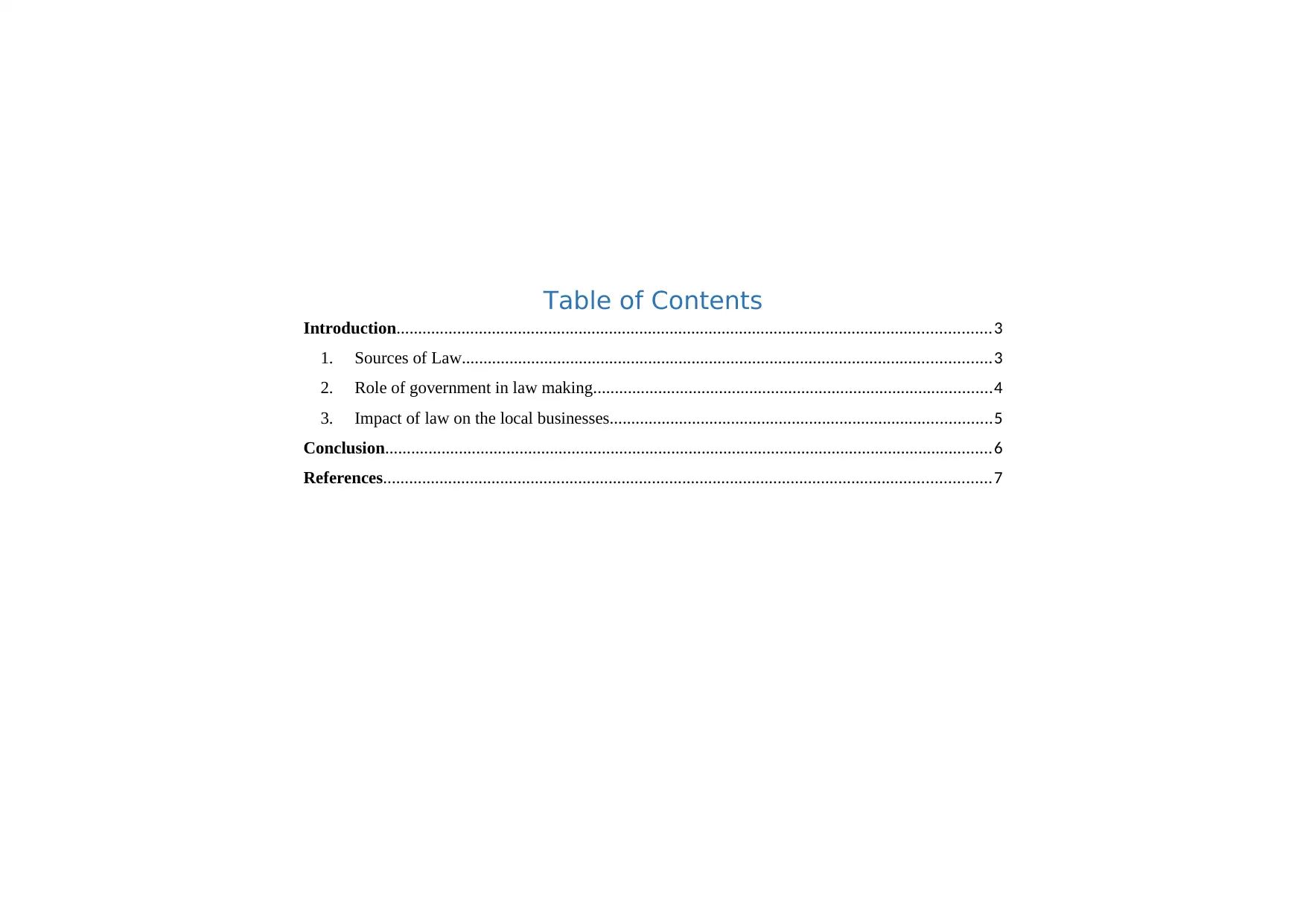
Table of Contents
Introduction.........................................................................................................................................3
1. Sources of Law..........................................................................................................................3
2. Role of government in law making............................................................................................4
3. Impact of law on the local businesses........................................................................................5
Conclusion............................................................................................................................................6
References............................................................................................................................................7
Introduction.........................................................................................................................................3
1. Sources of Law..........................................................................................................................3
2. Role of government in law making............................................................................................4
3. Impact of law on the local businesses........................................................................................5
Conclusion............................................................................................................................................6
References............................................................................................................................................7
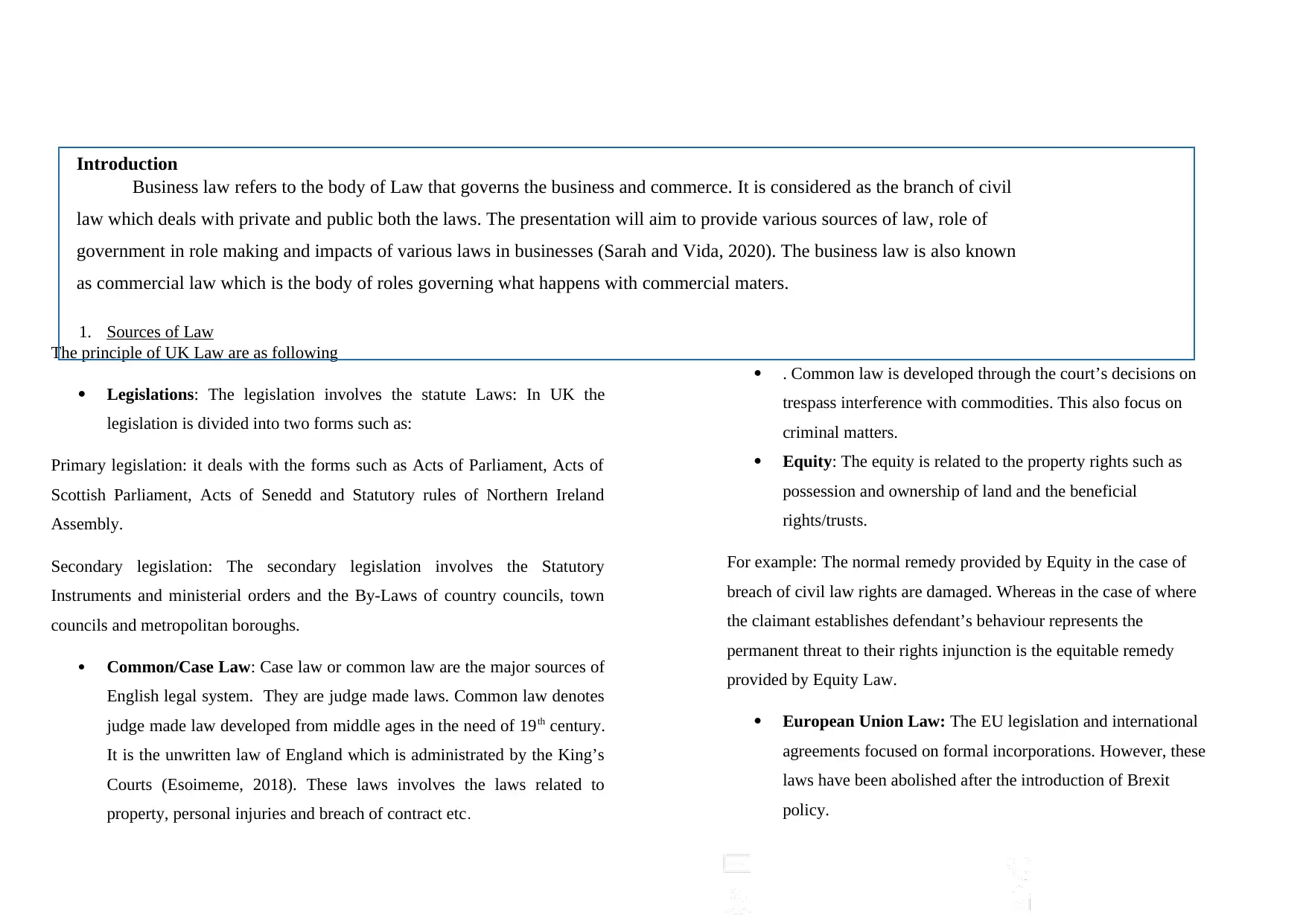
. Common law is developed through the court’s decisions on
trespass interference with commodities. This also focus on
criminal matters.
Equity: The equity is related to the property rights such as
possession and ownership of land and the beneficial
rights/trusts.
For example: The normal remedy provided by Equity in the case of
breach of civil law rights are damaged. Whereas in the case of where
the claimant establishes defendant’s behaviour represents the
permanent threat to their rights injunction is the equitable remedy
provided by Equity Law.
European Union Law: The EU legislation and international
agreements focused on formal incorporations. However, these
laws have been abolished after the introduction of Brexit
policy.
Contact@companyemail.com
1. Sources of Law
The principle of UK Law are as following
Legislations: The legislation involves the statute Laws: In UK the
legislation is divided into two forms such as:
Primary legislation: it deals with the forms such as Acts of Parliament, Acts of
Scottish Parliament, Acts of Senedd and Statutory rules of Northern Ireland
Assembly.
Secondary legislation: The secondary legislation involves the Statutory
Instruments and ministerial orders and the By-Laws of country councils, town
councils and metropolitan boroughs.
Common/Case Law: Case law or common law are the major sources of
English legal system. They are judge made laws. Common law denotes
judge made law developed from middle ages in the need of 19th century.
It is the unwritten law of England which is administrated by the King’s
Courts (Esoimeme, 2018). These laws involves the laws related to
property, personal injuries and breach of contract etc.
Introduction
Business law refers to the body of Law that governs the business and commerce. It is considered as the branch of civil
law which deals with private and public both the laws. The presentation will aim to provide various sources of law, role of
government in role making and impacts of various laws in businesses (Sarah and Vida, 2020). The business law is also known
as commercial law which is the body of roles governing what happens with commercial maters.
+1-202-555-0126
www.corporatewebsite.com
trespass interference with commodities. This also focus on
criminal matters.
Equity: The equity is related to the property rights such as
possession and ownership of land and the beneficial
rights/trusts.
For example: The normal remedy provided by Equity in the case of
breach of civil law rights are damaged. Whereas in the case of where
the claimant establishes defendant’s behaviour represents the
permanent threat to their rights injunction is the equitable remedy
provided by Equity Law.
European Union Law: The EU legislation and international
agreements focused on formal incorporations. However, these
laws have been abolished after the introduction of Brexit
policy.
Contact@companyemail.com
1. Sources of Law
The principle of UK Law are as following
Legislations: The legislation involves the statute Laws: In UK the
legislation is divided into two forms such as:
Primary legislation: it deals with the forms such as Acts of Parliament, Acts of
Scottish Parliament, Acts of Senedd and Statutory rules of Northern Ireland
Assembly.
Secondary legislation: The secondary legislation involves the Statutory
Instruments and ministerial orders and the By-Laws of country councils, town
councils and metropolitan boroughs.
Common/Case Law: Case law or common law are the major sources of
English legal system. They are judge made laws. Common law denotes
judge made law developed from middle ages in the need of 19th century.
It is the unwritten law of England which is administrated by the King’s
Courts (Esoimeme, 2018). These laws involves the laws related to
property, personal injuries and breach of contract etc.
Introduction
Business law refers to the body of Law that governs the business and commerce. It is considered as the branch of civil
law which deals with private and public both the laws. The presentation will aim to provide various sources of law, role of
government in role making and impacts of various laws in businesses (Sarah and Vida, 2020). The business law is also known
as commercial law which is the body of roles governing what happens with commercial maters.
+1-202-555-0126
www.corporatewebsite.com
⊘ This is a preview!⊘
Do you want full access?
Subscribe today to unlock all pages.

Trusted by 1+ million students worldwide
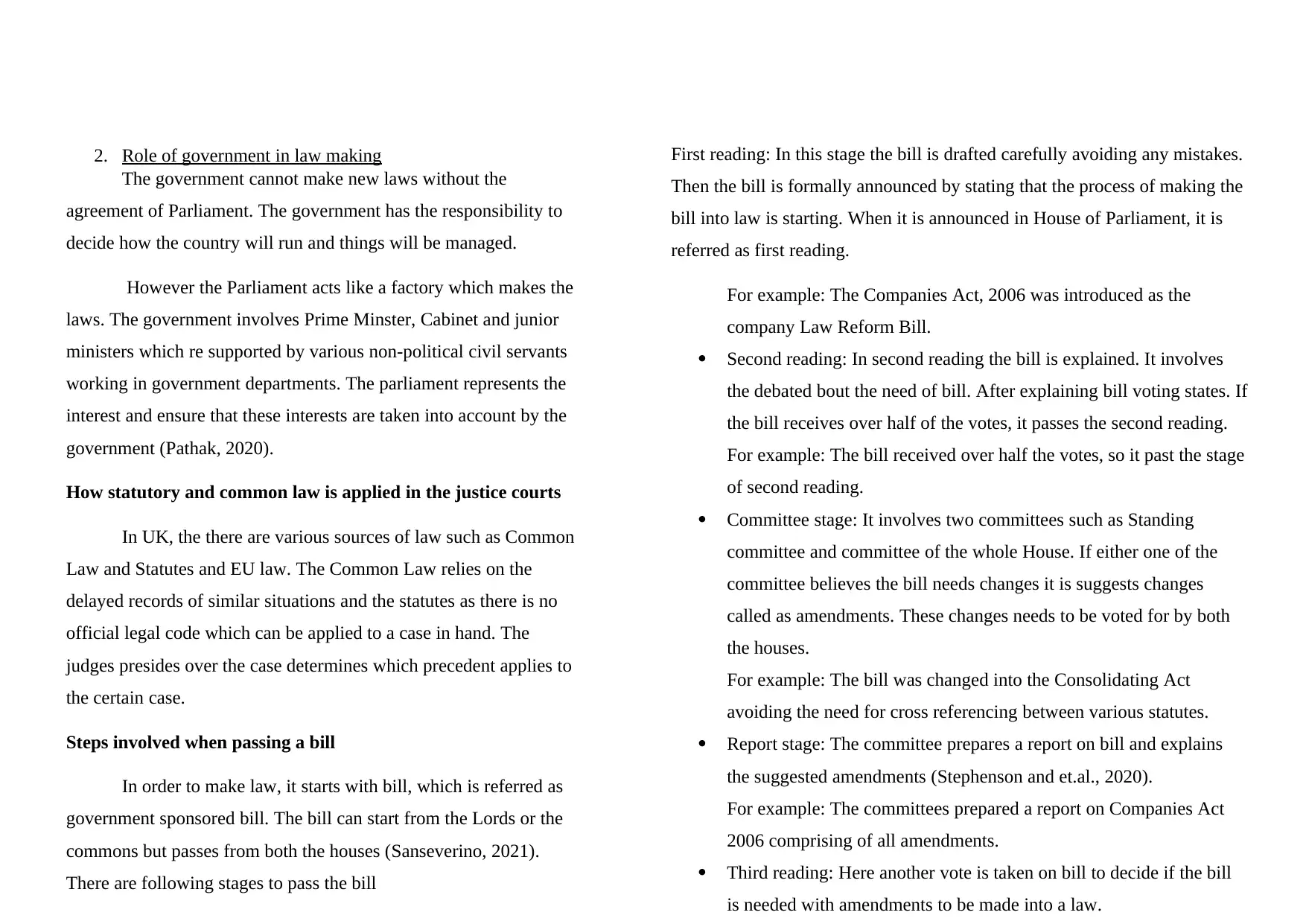
2. Role of government in law making
The government cannot make new laws without the
agreement of Parliament. The government has the responsibility to
decide how the country will run and things will be managed.
However the Parliament acts like a factory which makes the
laws. The government involves Prime Minster, Cabinet and junior
ministers which re supported by various non-political civil servants
working in government departments. The parliament represents the
interest and ensure that these interests are taken into account by the
government (Pathak, 2020).
How statutory and common law is applied in the justice courts
In UK, the there are various sources of law such as Common
Law and Statutes and EU law. The Common Law relies on the
delayed records of similar situations and the statutes as there is no
official legal code which can be applied to a case in hand. The
judges presides over the case determines which precedent applies to
the certain case.
Steps involved when passing a bill
In order to make law, it starts with bill, which is referred as
government sponsored bill. The bill can start from the Lords or the
commons but passes from both the houses (Sanseverino, 2021).
There are following stages to pass the bill
First reading: In this stage the bill is drafted carefully avoiding any mistakes.
Then the bill is formally announced by stating that the process of making the
bill into law is starting. When it is announced in House of Parliament, it is
referred as first reading.
For example: The Companies Act, 2006 was introduced as the
company Law Reform Bill.
Second reading: In second reading the bill is explained. It involves
the debated bout the need of bill. After explaining bill voting states. If
the bill receives over half of the votes, it passes the second reading.
For example: The bill received over half the votes, so it past the stage
of second reading.
Committee stage: It involves two committees such as Standing
committee and committee of the whole House. If either one of the
committee believes the bill needs changes it is suggests changes
called as amendments. These changes needs to be voted for by both
the houses.
For example: The bill was changed into the Consolidating Act
avoiding the need for cross referencing between various statutes.
Report stage: The committee prepares a report on bill and explains
the suggested amendments (Stephenson and et.al., 2020).
For example: The committees prepared a report on Companies Act
2006 comprising of all amendments.
Third reading: Here another vote is taken on bill to decide if the bill
is needed with amendments to be made into a law.
The government cannot make new laws without the
agreement of Parliament. The government has the responsibility to
decide how the country will run and things will be managed.
However the Parliament acts like a factory which makes the
laws. The government involves Prime Minster, Cabinet and junior
ministers which re supported by various non-political civil servants
working in government departments. The parliament represents the
interest and ensure that these interests are taken into account by the
government (Pathak, 2020).
How statutory and common law is applied in the justice courts
In UK, the there are various sources of law such as Common
Law and Statutes and EU law. The Common Law relies on the
delayed records of similar situations and the statutes as there is no
official legal code which can be applied to a case in hand. The
judges presides over the case determines which precedent applies to
the certain case.
Steps involved when passing a bill
In order to make law, it starts with bill, which is referred as
government sponsored bill. The bill can start from the Lords or the
commons but passes from both the houses (Sanseverino, 2021).
There are following stages to pass the bill
First reading: In this stage the bill is drafted carefully avoiding any mistakes.
Then the bill is formally announced by stating that the process of making the
bill into law is starting. When it is announced in House of Parliament, it is
referred as first reading.
For example: The Companies Act, 2006 was introduced as the
company Law Reform Bill.
Second reading: In second reading the bill is explained. It involves
the debated bout the need of bill. After explaining bill voting states. If
the bill receives over half of the votes, it passes the second reading.
For example: The bill received over half the votes, so it past the stage
of second reading.
Committee stage: It involves two committees such as Standing
committee and committee of the whole House. If either one of the
committee believes the bill needs changes it is suggests changes
called as amendments. These changes needs to be voted for by both
the houses.
For example: The bill was changed into the Consolidating Act
avoiding the need for cross referencing between various statutes.
Report stage: The committee prepares a report on bill and explains
the suggested amendments (Stephenson and et.al., 2020).
For example: The committees prepared a report on Companies Act
2006 comprising of all amendments.
Third reading: Here another vote is taken on bill to decide if the bill
is needed with amendments to be made into a law.
Paraphrase This Document
Need a fresh take? Get an instant paraphrase of this document with our AI Paraphraser
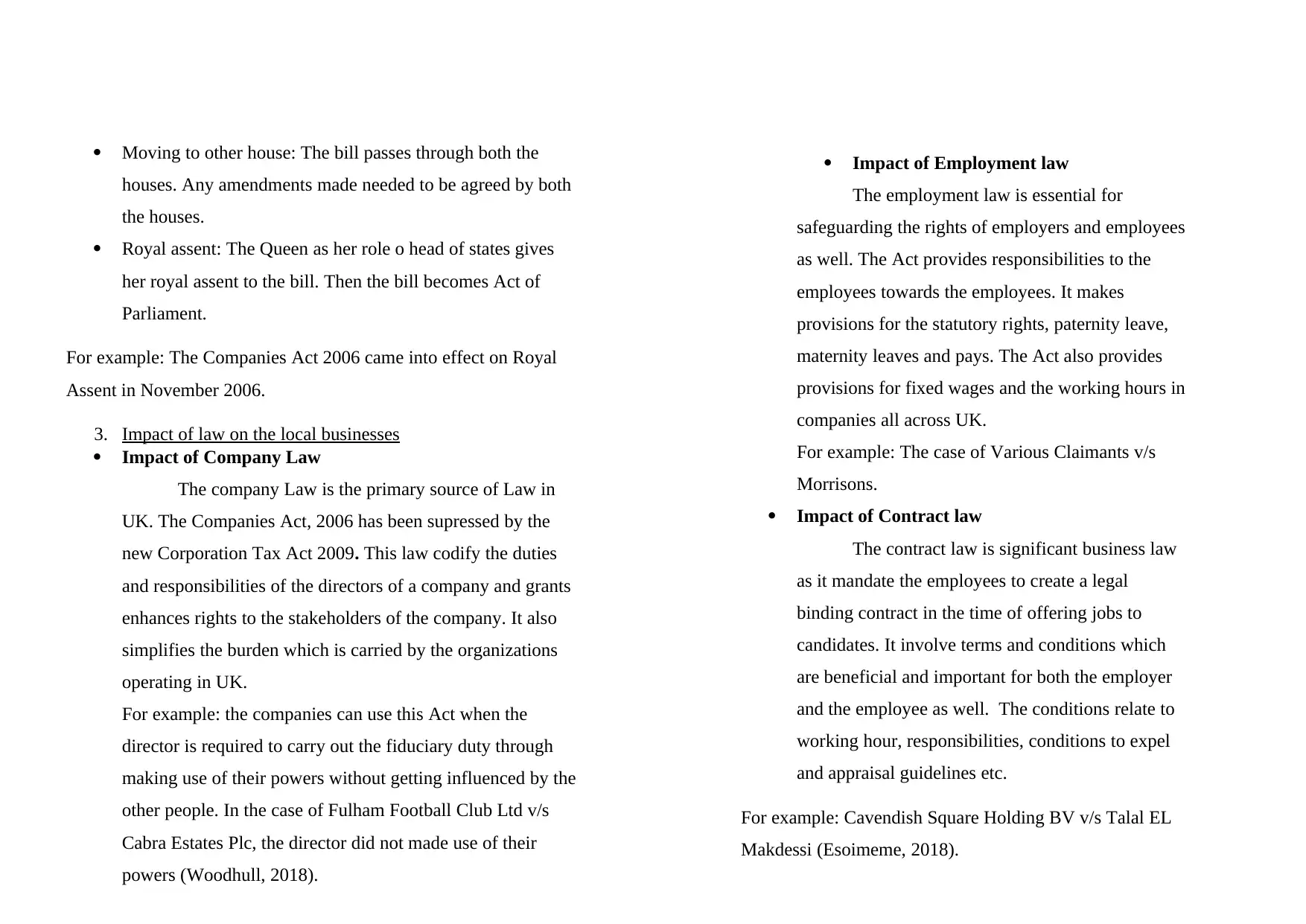
Moving to other house: The bill passes through both the
houses. Any amendments made needed to be agreed by both
the houses.
Royal assent: The Queen as her role o head of states gives
her royal assent to the bill. Then the bill becomes Act of
Parliament.
For example: The Companies Act 2006 came into effect on Royal
Assent in November 2006.
3. Impact of law on the local businesses
Impact of Company Law
The company Law is the primary source of Law in
UK. The Companies Act, 2006 has been supressed by the
new Corporation Tax Act 2009. This law codify the duties
and responsibilities of the directors of a company and grants
enhances rights to the stakeholders of the company. It also
simplifies the burden which is carried by the organizations
operating in UK.
For example: the companies can use this Act when the
director is required to carry out the fiduciary duty through
making use of their powers without getting influenced by the
other people. In the case of Fulham Football Club Ltd v/s
Cabra Estates Plc, the director did not made use of their
powers (Woodhull, 2018).
Impact of Employment law
The employment law is essential for
safeguarding the rights of employers and employees
as well. The Act provides responsibilities to the
employees towards the employees. It makes
provisions for the statutory rights, paternity leave,
maternity leaves and pays. The Act also provides
provisions for fixed wages and the working hours in
companies all across UK.
For example: The case of Various Claimants v/s
Morrisons.
Impact of Contract law
The contract law is significant business law
as it mandate the employees to create a legal
binding contract in the time of offering jobs to
candidates. It involve terms and conditions which
are beneficial and important for both the employer
and the employee as well. The conditions relate to
working hour, responsibilities, conditions to expel
and appraisal guidelines etc.
For example: Cavendish Square Holding BV v/s Talal EL
Makdessi (Esoimeme, 2018).
houses. Any amendments made needed to be agreed by both
the houses.
Royal assent: The Queen as her role o head of states gives
her royal assent to the bill. Then the bill becomes Act of
Parliament.
For example: The Companies Act 2006 came into effect on Royal
Assent in November 2006.
3. Impact of law on the local businesses
Impact of Company Law
The company Law is the primary source of Law in
UK. The Companies Act, 2006 has been supressed by the
new Corporation Tax Act 2009. This law codify the duties
and responsibilities of the directors of a company and grants
enhances rights to the stakeholders of the company. It also
simplifies the burden which is carried by the organizations
operating in UK.
For example: the companies can use this Act when the
director is required to carry out the fiduciary duty through
making use of their powers without getting influenced by the
other people. In the case of Fulham Football Club Ltd v/s
Cabra Estates Plc, the director did not made use of their
powers (Woodhull, 2018).
Impact of Employment law
The employment law is essential for
safeguarding the rights of employers and employees
as well. The Act provides responsibilities to the
employees towards the employees. It makes
provisions for the statutory rights, paternity leave,
maternity leaves and pays. The Act also provides
provisions for fixed wages and the working hours in
companies all across UK.
For example: The case of Various Claimants v/s
Morrisons.
Impact of Contract law
The contract law is significant business law
as it mandate the employees to create a legal
binding contract in the time of offering jobs to
candidates. It involve terms and conditions which
are beneficial and important for both the employer
and the employee as well. The conditions relate to
working hour, responsibilities, conditions to expel
and appraisal guidelines etc.
For example: Cavendish Square Holding BV v/s Talal EL
Makdessi (Esoimeme, 2018).
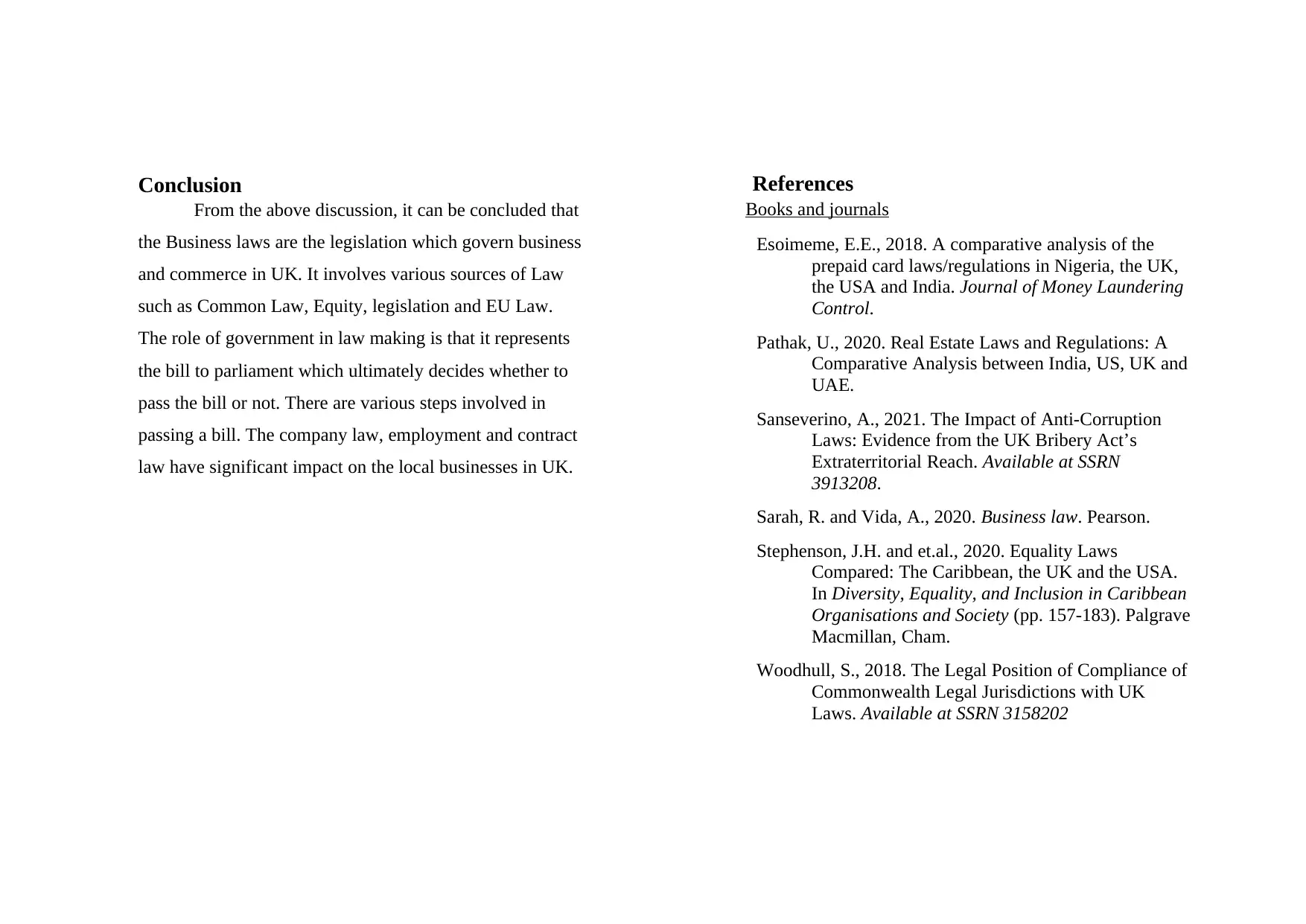
References
Books and journals
Esoimeme, E.E., 2018. A comparative analysis of the
prepaid card laws/regulations in Nigeria, the UK,
the USA and India. Journal of Money Laundering
Control.
Pathak, U., 2020. Real Estate Laws and Regulations: A
Comparative Analysis between India, US, UK and
UAE.
Sanseverino, A., 2021. The Impact of Anti-Corruption
Laws: Evidence from the UK Bribery Act’s
Extraterritorial Reach. Available at SSRN
3913208.
Sarah, R. and Vida, A., 2020. Business law. Pearson.
Stephenson, J.H. and et.al., 2020. Equality Laws
Compared: The Caribbean, the UK and the USA.
In Diversity, Equality, and Inclusion in Caribbean
Organisations and Society (pp. 157-183). Palgrave
Macmillan, Cham.
Woodhull, S., 2018. The Legal Position of Compliance of
Commonwealth Legal Jurisdictions with UK
Laws. Available at SSRN 3158202
Conclusion
From the above discussion, it can be concluded that
the Business laws are the legislation which govern business
and commerce in UK. It involves various sources of Law
such as Common Law, Equity, legislation and EU Law.
The role of government in law making is that it represents
the bill to parliament which ultimately decides whether to
pass the bill or not. There are various steps involved in
passing a bill. The company law, employment and contract
law have significant impact on the local businesses in UK.
Books and journals
Esoimeme, E.E., 2018. A comparative analysis of the
prepaid card laws/regulations in Nigeria, the UK,
the USA and India. Journal of Money Laundering
Control.
Pathak, U., 2020. Real Estate Laws and Regulations: A
Comparative Analysis between India, US, UK and
UAE.
Sanseverino, A., 2021. The Impact of Anti-Corruption
Laws: Evidence from the UK Bribery Act’s
Extraterritorial Reach. Available at SSRN
3913208.
Sarah, R. and Vida, A., 2020. Business law. Pearson.
Stephenson, J.H. and et.al., 2020. Equality Laws
Compared: The Caribbean, the UK and the USA.
In Diversity, Equality, and Inclusion in Caribbean
Organisations and Society (pp. 157-183). Palgrave
Macmillan, Cham.
Woodhull, S., 2018. The Legal Position of Compliance of
Commonwealth Legal Jurisdictions with UK
Laws. Available at SSRN 3158202
Conclusion
From the above discussion, it can be concluded that
the Business laws are the legislation which govern business
and commerce in UK. It involves various sources of Law
such as Common Law, Equity, legislation and EU Law.
The role of government in law making is that it represents
the bill to parliament which ultimately decides whether to
pass the bill or not. There are various steps involved in
passing a bill. The company law, employment and contract
law have significant impact on the local businesses in UK.
⊘ This is a preview!⊘
Do you want full access?
Subscribe today to unlock all pages.

Trusted by 1+ million students worldwide

1 out of 7
Related Documents
Your All-in-One AI-Powered Toolkit for Academic Success.
+13062052269
info@desklib.com
Available 24*7 on WhatsApp / Email
![[object Object]](/_next/static/media/star-bottom.7253800d.svg)
Unlock your academic potential
Copyright © 2020–2026 A2Z Services. All Rights Reserved. Developed and managed by ZUCOL.




